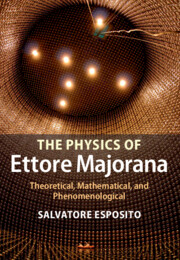Book contents
- Frontmatter
- Contents
- Acknowledgments
- Part I Introducing the character
- Part II Atomic physics
- Part III Nuclear and statistical physics
- Part IV Relativistic fields and group theory
- Part V Quantum field theory
- 9 Scalar electrodynamics
- 10 Photons and electrons
- Part VI Fundamental theories and other topics
- Part VII Beyond Majorana
- Appendix Molecular bonding in quantum mechanics
- References
- Author index
- Subject index
10 - Photons and electrons
Published online by Cambridge University Press: 18 December 2014
- Frontmatter
- Contents
- Acknowledgments
- Part I Introducing the character
- Part II Atomic physics
- Part III Nuclear and statistical physics
- Part IV Relativistic fields and group theory
- Part V Quantum field theory
- 9 Scalar electrodynamics
- 10 Photons and electrons
- Part VI Fundamental theories and other topics
- Part VII Beyond Majorana
- Appendix Molecular bonding in quantum mechanics
- References
- Author index
- Subject index
Summary
Around 1933–34, Majorana was invited to a conference in Russia [1, 320]:
Dear Sir, I thank you warmly for your invitation to participate in the next congress that will take place in Leningrad. I am happy to accept and to have the opportunity to visit, at the same time, your big and beautiful country.
The conference mentioned in this letter was either the First All-Union Conference on Nuclear Physics, held in September 1933 at the Leningrad Physico-Technical Institute, or, more likely, the International Conference of Theoretical Physics that took place in May 1934 in Kharkov [321]. The uncertainty derives from the peculiar fact that, contrary to what is stated in the letter, and for some unknown reason, Majorana did not participate in any conferences in Russia. However, according to the reconstruction in Ref. [321], we probably have the (incomplete) text that Majorana prepared for such a conference, which deals with quantum electrodynamics, a frontier research topic tackled by many theoretical physicists of the time.
In these notes we find only a sketch of the quantum theory developed by Majorana, but it is nevertheless quite interesting due to the particular physical interpretation behind it, so we will give an account of it in this chapter. Majorana repeatedly studied quantum (and classical) electrodynamics and related applications from different points of view, and some of the material discussed in the notes for the conference is just a re-elaboration of previous studies that can be found in his personal notebooks. As a matter of fact, Majorana obtained several original, though never published results, only some of which were independently discovered by others.
The relevance of what is discussed in this chapter, however, does not lie mainly in Majorana's actual findings, as was the case for earlier chapters, but rather in the original methods developed and the continuous attention paid by him to the physical interpretation of the theory, which is particularly intriguing when dealing with quantum electrodynamics. This attitude was, nevertheless, an intrinsic characteristic of Majorana, for whom theory was inextricably related to phenomenology.
- Type
- Chapter
- Information
- The Physics of Ettore MajoranaTheoretical, Mathematical, and Phenomenological, pp. 214 - 226Publisher: Cambridge University PressPrint publication year: 2014



